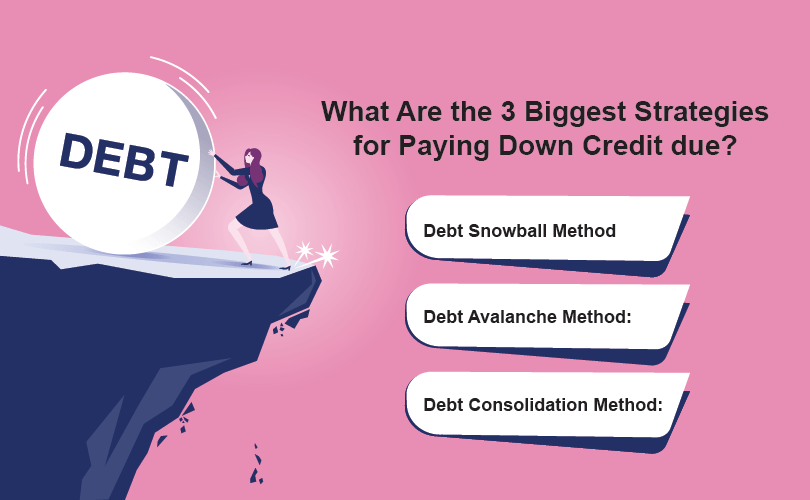

Has the mountain of financial stress become really overwhelming for you? Are you trying really hard to get out of all the stress but cannot find a way out? Large vs small credit dues causing trouble? Which to pay first? Well, there are certainly many questions you may have or come across that are still left unheard and unsolved. We’re here to give you just the right advice and solution. Read on to know more!
Deciding which to pay off first is a critical part of managing your finances effectively. Not just one but so many strategies out in the world that will surely help you find the right order to pay your credit dues. Given below are some great steps to encourage your decision:
• Note Down Your Credit dues: Make a list of all your credit dues, whether small or big. This includes credit card balances, personal loans, mortgages, etc.
• Understand the Interest Rates: Interest rates play a significant role in the cost of your credit dues. High-interest credit dues can quickly accumulate and cost you more in the long run. Sort your credit dues in order of their interest rates, from highest to lowest. This is a critical step in deciding which Credit to prioritize.
• Consider the Debt Avalanche Method: This method involves paying off the credit limit with the highest interest rate first. By tackling the highest-interest credit due, you’re minimizing the overall interest you’ll pay over time. This method can save you money.
• Try the Debt Snowball Method: The method focuses on paying off the smallest credit due first. While it may not be the most financially efficient method, it can provide quick wins and psychological motivation. Paying off smaller credit dues can give you a sense of accomplishment and encourage you to continue.
• Evaluate Your Financial Objectives: Deciding which Credit to pay off first depends greatly on your financial objectives and priorities. The Credit due Avalanche approach can be the ideal option if your main objective is to reduce interest costs and pay off Credit as soon as feasible. However, if you need the psychological boost of seeing credit dues disappear one by one, the Credit due Snowball method might be more suitable.
• Evaluate Your Monthly Cash Flow: Consider your monthly budget and cash flow. Can you comfortably allocate extra funds toward credit dues repayment? If so, you might choose to follow the Credit due Avalanche method. However, if you have limited disposable income, starting with smaller credit dues (Credit due Snowball) can provide you with a sense of control and progress.
• Emergency Fund: Before aggressively paying off credit dues, it’s wise to have a small emergency fund in place. This fund can cover unexpected expenses, reducing the need to rely on credit cards or loans during financial emergencies.
It’s crucial to take your situation and the kind of Credit you have into account when choosing which to pay off first. There is no one solution that works for everyone; instead, the optimal course of action will depend on your financial objectives and the specifics of the obligations at hand.
• Interest Rates: Assess the interest rates on your old credit dues. Assuming the financing cost on your past advance is a lot more prominent than the loan fee on your new obligation, it might seem okay to take care of the old credit dues first. High-interest due can accumulate quickly and cost you more in the long run.
• Legal Obligations: Some old credit dues, particularly those in collections or with legal action pending, may have more immediate consequences if left unpaid. These situations can negatively impact your credit score and even result in legal action. It’s often wise to address these older credit dues to prevent further complications.
• Psychological Relief: Paying off old credit dues can provide a sense of closure and psychological relief. You can liberate yourself from the profound weight of past monetary missteps, which can be a huge inspiration for certain individuals.
• Loan costs: In the event that your new credit dues has essentially higher loan fees than your old obligation, it could seem OK to zero in on squaring away the new obligation. Prioritizing high-interest credit due can help you save money on interest expenses over time.
• Current Financial Stability: Consider your current financial situation. If you are battling to meet the base installments on your new credit dues and it’s influencing your day to day existence, it very well might be important to address the new credit dues to forestall further monetary strain.
• Terms and Conditions: Review the terms and conditions of both old and new credit dues. Some older Debt may have more favorable terms, such as lower interest rates or more flexible repayment options. In such cases, it might make sense to prioritize new due if the terms are less favorable.
Making a comprehensive credit dues restitution plan that records for your obligations in general — old and new — is much of the time a shrewd thought. Loan costs, least installments, your current monetary status, and your drawn out monetary targets ought to be generally considered in this technique.
Additionally, consider building an emergency fund to provide a financial cushion. This fund can help you handle unexpected expenses without relying on credit or taking on more credit due.
Ultimately, the decision of whether to pay off old or new credit due should align with your overall financial goals and circumstances. If you’re uncertain about which credit dues to prioritize, seeking advice from a financial advisor or credit counselor can provide you with a personalized credit due repayment strategy.

Paying down overdues can be a challenging but rewarding financial endeavor. Here are three of the biggest strategies for effectively paying down credit due:
The method is a strategy popularized by personal finance expert Dave Ramsey. This approach focuses on paying off your smallest credit dues first while making minimum payments on your larger credit dues.This is the secret:
• Stage 1: Rundown every one of your obligations, from littlest to biggest, paying little mind to loan fee.
• Step 2: Make minimum payments on all credit dues except the smallest one.
• Step 3: Allocate any extra funds you have toward the smallest credit due.
• Step 4: Once the smallest due is paid off, roll the amount you were paying on it into the next smallest credit due.
Repeat these steps until all credit dues are paid off.
The method is effective because it provides quick wins, boosting motivation as you eliminate smaller credit dues. This psychological encouragement can help you stay committed to the credit due repayment process.
The method focuses on paying off credit dues with the highest interest rates first. This strategy minimizes the total interest you pay over time, saving you money. Here’s how to implement it:
• Step 1: List all your credit dues in order of their interest rates, from highest to lowest.
• Step 2: Make minimum payments on all credit dues except the one with the highest interest rate.
• Step 3: Allocate any extra funds you have toward the high-interest credit due.
• Step 4: Once the high-interest is paid off, move to the credit with the next highest interest rate.
Continue this process until all credit dues are eliminated.
The method is financially efficient because it reduces the overall interest you pay, making it a better choice for those who prioritize saving money.
A financial strategy that involves combining multiple credit dues into a single, more manageable credit due. This approach can make it simpler to square away credit dues by improving on your monetary commitments and possibly diminishing your loan fees. This is the way you can utilize the credit dues union technique to square away your obligations:
• Stage 1: Survey Your Credit dues by making a complete rundown of every one of your obligations, including the aggregate sum owed, financing costs, and least regularly scheduled installments.
• Step 2: Explore Options like Balance Transfer Credit Card, Personal Loan, etc.
• Step 3: Compare Offers by researching and comparing different this method options to find the one that offers the best terms
• Step 4: Apply for the Consolidation Loan or Credit Card
While there are several effective strategies for paying down credit due, there are also some methods to avoid, as they can lead to financial pitfalls and make your credit situation worse. Here are some payment methods to steer clear of:
• Minimum Payments Only: Paying only the minimum required on your credit dues can be a costly mistake. The base installment is commonly intended to save you in the red for a drawn-out period, and you’ll wind up paying a critical sum in interest. It’s important to pay more than the minimum whenever possible to accelerate your credit due repayment.
• Neglecting Budgeting: Failing to create and stick to a budget is a common mistake. Without a spending plan, you might not have a reasonable image of your monetary circumstance, prompting overspending and trouble in designating additional assets for credit dues reimbursement.
• Ignoring High-Interest Credit dues: Ignoring credit dues with the highest interest rates can be detrimental. These credit dues accrue interest at a faster rate, costing you more money over time. Prioritizing high-interest credit dues can save you money and help you become credit due-free faster.
• Consolidating Debt Without a Plan: The method can be a valuable tool, but it should be used with a clear repayment plan in mind. Avoid consolidating your credit dues without a strategy for paying off the new, consolidated credit due. You will end up in consolidation and more credit dues if you don’t have a good plan.
• Payday Credits or Expensive Loans: Payday advances and other exorbitant loans frequently have inordinate financing costs and charges.Depending on such loans to pay off existing due can trap you in a cycle of financial stress that is extremely difficult to break.
• Making Emotional Decisions: Making emotional decisions can cause financial instability and disrupt relationships. Examples of these decisions include borrowing money from friends and family without a clear payback plan. It’s essential to approach such arrangements with transparency and responsibility.
• Delaying Credit due Repayment: Procrastinating on credit due repayment can result in a snowballing effect, as interest continues to accrue.
• Relying on Windfalls: Counting on unexpected windfalls, such as tax refunds or bonuses, to pay off credit is risky. These windfalls may not materialize as expected, leaving you in a precarious financial position.
It’s crucial to approach Debt repayment with a well-thought-out strategy, disciplined budgeting, and a commitment to financial responsibility. Avoiding these counterproductive credit due payment methods can help you regain control of your finances and work toward becoming credit due-free.





